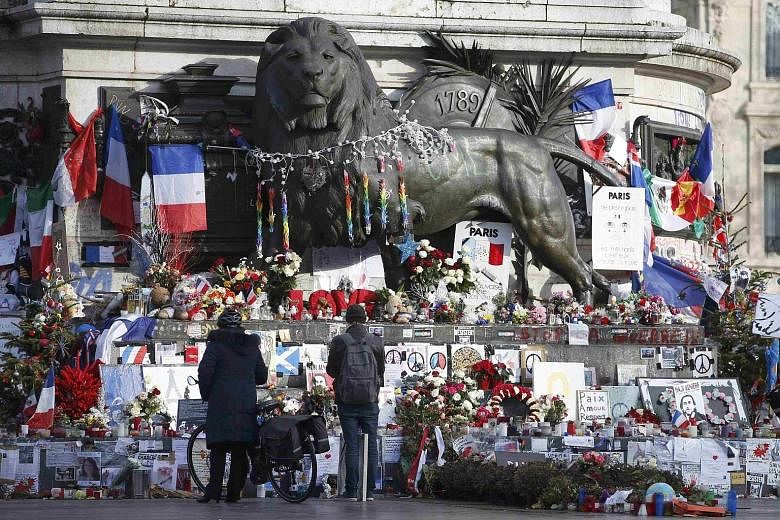PARIS • French satirical weekly Charlie Hebdo published a special edition yesterday on the eve of the anniversary of a militant attack that wiped out most of its staff, prompting protests from the Vatican over a cover lampooning God.
The publication came a day after French President Francois Hollande unveiled a plaque in memory of the victims and the widow of a slain police bodyguard said she was taking legal action over alleged security failings.
In typical Charlie Hebdo fashion, the special edition features a bloodstained, bearded God-figure with a Kalashnikov slung over his shoulder under the headline: "One year on: The killer is still at large."
The Vatican criticised the cover for failing to "acknowledge or to respect believers' faith in God, regardless of the religion".
The cover is typical of the fiercely secular publication whose drawings of the Prophet Muhammad drew the fury of Muslims around the world and inspired the attack on its offices on Jan 7 last year.
Eight of its staff were gunned down by brothers Said and Cherif Kouachi and several others in and around the building in the assault, which kick-started three days of terror in the French capital that would eventually leave 17 dead.
The bloodshed stunned a nation that has become a prized target of militants and was again plunged into grief in November when 130 people were killed in coordinated attacks around Paris.
On Tuesday, Mr Hollande began the commemorations by inaugurating a plaque at Charlie Hebdo's former offices, where cartoonists who were household names in France - nicknamed Cabu, Wolinski and Charb - were killed.
However, the widow of Mr Georges Wolinski, Ms Maryse Wolinski, said she was "furious" to see her husband's name misspelled on the plaque. Wolinski appeared as "Wolinsky", she said. Paris Mayor Anne Hidalgo had promised to fix the mistake, she added.
Another widow, Ms Ingrid Brinsolaro, whose husband Franck Brinsolaro died as a bodyguard in the attack, said she had filed a lawsuit claiming that he was left vulnerable because Charlie Hebdo was inadequately protected.
"To me, Franck was sacrificed; there is no other word for it. He saw shortcomings, he regretted the lack of security at the offices. He said it was a 'sieve' and it was impossible to do his job right in those conditions," she said on French television on Tuesday.
The attacks on Charlie Hebdo, a Jewish supermarket and police brought millions into the streets in protest and led to much soul-searching over the country's cherished secularism as well as social issues such as integration.
"It was unthinkable that, in France in the 21st century, journalists would be killed by religion," cartoonist Riss, who lost the use of his right arm in the attack, wrote in the editorial of the special edition.
"We saw France as an island of secularism, where it was possible to tell jokes, draw, laugh, without worrying about dogma, fanatics."
He said that with the latest cover, which he drew, he "wanted to go above one religion or another".
"It is the idea of God itself that we, at Charlie, contest. You need to shake up people's ideas or they stay stuck in their positions."
The special edition devotes several pages to the topic of secularism, as well as reflections on the terrifying minutes when the Kouachi brothers burst into an editorial meeting spraying gunfire.
The attack, claimed by Al-Qaeda's branch in the Arabian Peninsula, was not the first on the publication, which was firebombed in 2011.
"I ask myself sometimes if I am making the newspaper they would have made. To me, they are no longer there, but they are not gone," Riss said, speaking of his colleagues killed in the attack last year.
AGENCE FRANCE-PRESSE

